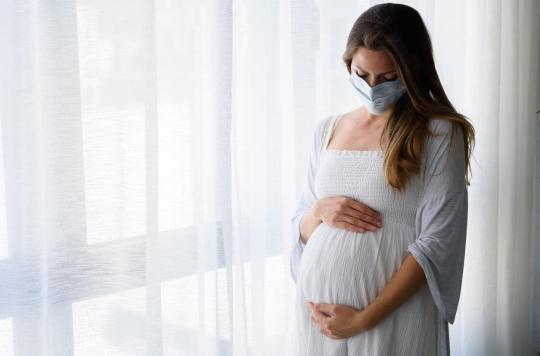The immune system’s reaction to the Covid-19 virus increases the risk of preterm birth, preeclampsia and other neonatal problems in pregnant women.

- Cases of preeclampsia or premature labor are observed in pregnant women infected with the coronavirus
- It is the reaction of their immune system that is in question rather than the action of the virus
- The authors of the study suggest increased monitoring of pregnant women infected at the very beginning of their pregnancy
It is not the virus that is dangerous for pregnant women but the reaction of their immune system when they are contaminated, according to a study published in the journal Med. The researchers estimate that they would have a greater risk of premature births, pre-eclampsia and other neonatal problems than pregnant women who do not have Covid-19. But, for the moment, scientists do not know precisely the reasons for this phenomenon.
Between 50,000 and 60,000 children are born prematurely each year
A delivery is said to be premature when it occurs before eight and a half months of pregnancy. It can cause risks for the baby, going as far as death if the birth takes place too early. Each year, between 50,000 and 60,000 children are born prematurely according to the National Institute for Health and Medical Research (Inserm). Pre-eclampsia, on the other hand, is a complication occurring during the last trimester of pregnancy, with no known predisposing factor. Manifestations are high blood pressure and strong albuminuria, kidney problem. The finding of these signs in a pregnant woman requires hospitalization and the initiation of antihypertensive treatment. But the most effective treatment remains childbirth, the triggering of which is imperative in the absence of a rapid response to the antihypertensive, whatever the date of the term.
Infected pregnant women have a stronger immune response
During their work, the scientists sought to find out whether Covid-19 could affect the placental tissue of pregnant women infected with the virus. Their results prove that traces of SARS-CoV-2 are rare there because the placenta of infected mothers has a much higher level of immune system activity than that of uninfected pregnant women. “The good news is that the placenta is mounting a strong defense against an infection far away, in the lungs or nasal tissues. underlines Shelli Farhadian, one of the authors of the study. On the other hand, the high level of immune system activity could lead to other deleterious effects on pregnancy.“The immune mechanisms put in place to protect placental cells included, among others, markers associated with certain complications of pregnancy, such as preeclampsia. It is for this reason that women infected with Covid-19 would be more at risk. likely to have such problems.
“Closely monitor women who are infected early in pregnancy”
To arrive at their results, the team of researchers analyzed the blood and placental tissues of 39 pregnant women. Some were positive for Covid-19 at different stages of pregnancy, and others were not. Thus, they found traces of the virus in only two samples of placental tissue. In contrast, they observed ACE2 receptors – which the virus uses to enter cells – in the placentas of most women infected during the first trimester of pregnancy, suggesting that they would be at greater risk of have complications. In general, these receptors had disappeared in healthy patients in later stages of pregnancy. “It is very important to closely monitor pregnant women who are infected early in pregnancy.”, concludes Shelli Farhadian.
Until now, the activity of the immune system in the placenta during infections like Covid-19 has not been studied. Scientists therefore do not know precisely the impact that this could have on the development of the fetus.
.















